The article titled "10 Benefits of ABA Functional Communication Training for Your Child" highlights the many advantages of implementing ABA functional communication training (FCT) for children, especially those with autism. These benefits range from enhanced communication skills to reduced problem behaviors, improved social interactions, increased independence, and overall well-being. Research supports the effectiveness of FCT in fostering better communication and emotional health in children, making it a valuable resource for parents.
Personalized FCT strategies empower children to express their needs and desires more effectively. This not only reduces frustration and challenging behaviors but also leads to improved relationships and a better quality of life. Research shows that consistent application of FCT can lead to substantial behavioral improvements and social integration, showcasing its crucial role in the development of children with autism.
Let’s explore this together! Understanding how FCT can make a difference in your child's life is essential. By embracing these strategies, you can help your child thrive, and that’s something to celebrate! We're here to help you every step of the way!
ABA functional communication training (FCT) is truly transforming communication for children with autism, providing a lifeline for those who find it challenging to express their needs and emotions. This innovative approach not only boosts expressive language skills but also significantly reduces challenging behaviors, paving the way for greater independence and social integration.
But here’s the big question: how can caregivers effectively support and reinforce these strategies at home to maximize their child's progress? Let’s explore the multifaceted benefits of FCT together! It’s not just about individual growth; family involvement plays a critical role in creating a nurturing environment for development. We’re here to help you every step of the way!
At Rori Care, we take a unique approach to ABA therapy with our personalized ABA functional communication training. This method is designed to meet the specific interaction needs of each individual, ensuring that our interventions are tailored to their unique challenges and strengths. Our clinical leadership team, made up of skilled and caring experts, is passionate about neurodiversity and works tirelessly to help young individuals succeed.
By focusing on personalized strategies that include measurable objectives and evidence-based methods, Rori Care empowers youth to develop essential communication skills for their growth and social integration through ABA functional communication training. We also recognize the importance of caregiver education, equipping parents with ABA principles and strategies to actively support their children's behavioral goals. This way, you can make informed decisions and collect data that truly matters.
To further boost your child's progress, why not set specific, achievable goals at home that align with the strategies learned in therapy? Let’s explore this together! Your involvement can make a significant difference in their journey, and we're here to help you every step of the way!
ABA functional communication training is such an important tool for helping kids with autism develop their expressive language skills! By teaching them to use practical communication methods—like gestures, pictures, or even speech—ABA functional communication training helps them share their needs and wants more effectively. This approach is all about the child, boosting their confidence and reducing the frustration that can come from communication barriers. As a result, they can have more successful interactions with their peers and caregivers.
When caregivers get involved in using FCT strategies, it makes a huge difference! Many kids—about 90%—who benefit from early intensive behavioral intervention (EIBI) see significant progress. This teamwork really enhances the overall effectiveness of ABA functional communication training, which is the only scientifically supported treatment for autism that is covered by insurance. Together, we can foster better behavioral outcomes and support developmental goals. Let’s explore this together and see how we can make a positive impact!
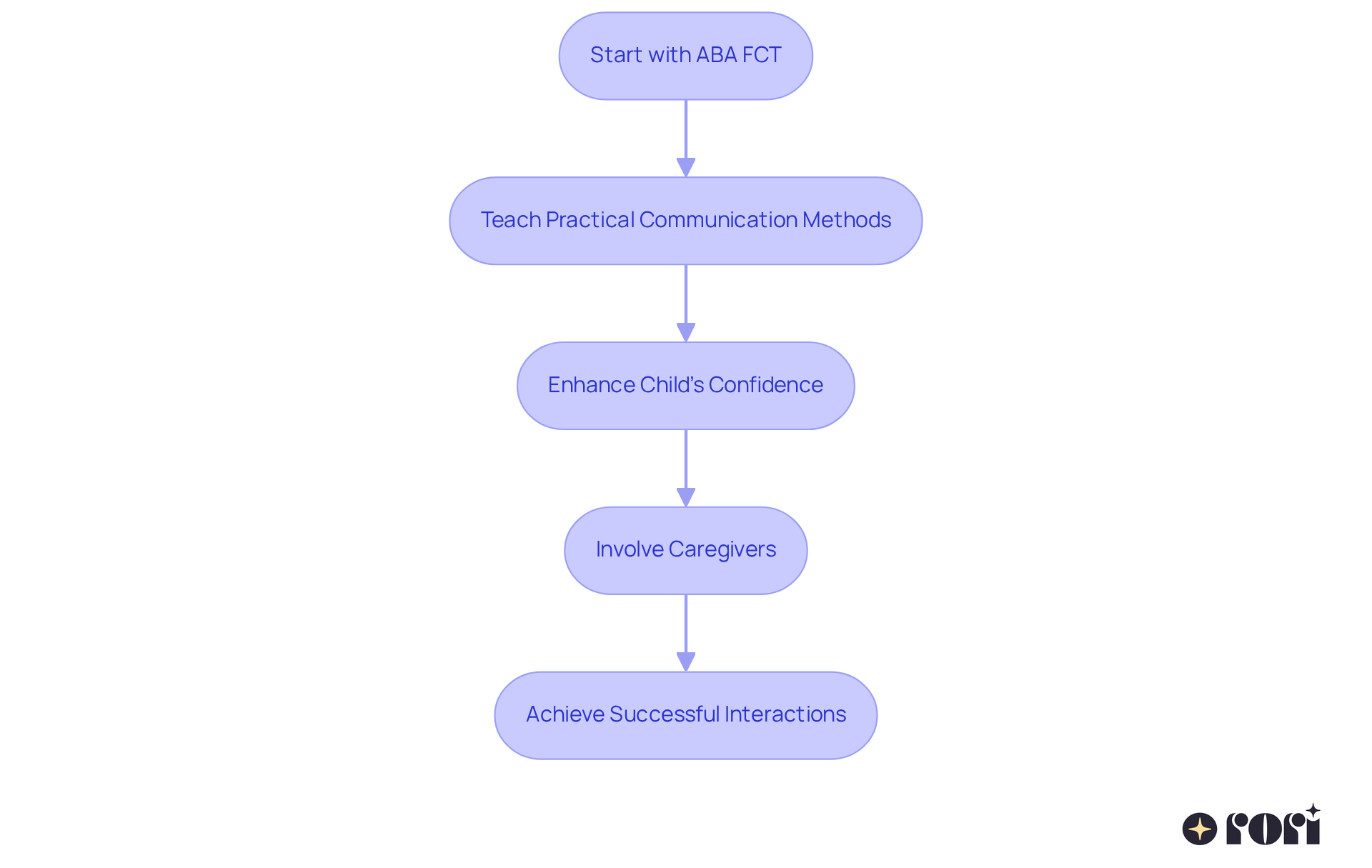
ABA functional communication training is a wonderful approach that can significantly reduce problem behaviors in youths with autism by helping them develop effective verbal skills. Many young individuals often resort to challenging behaviors when they find it hard to express their needs. By teaching them alternative ways to communicate—like verbal requests, sign language, or the Picture Exchange System (PECS)—ABA functional communication training empowers these individuals to express themselves more clearly. This proactive strategy not only helps ease their frustration but also lowers the chances of disruptive behaviors.
Research shows that classrooms using FCT can see an average reduction of 75% in disruptive behaviors within just the first semester! Plus, many young individuals experience significant improvements in their behavior within only 2-4 weeks of consistent FCT practice. For example, a child who used to hit others to ask for a toy learned to say, 'I want that,' effectively replacing aggression with a more socially acceptable way to communicate.
Behavior analysts emphasize that improving interaction skills leads to noticeable decreases in frustration, which helps build stronger connections with peers and caregivers. As one specialist noted, ABA functional communication training not only addresses the underlying interaction challenges but also promotes independence and better social integration. The positive effects of FCT go beyond immediate behavior changes, enhancing the overall quality of life for these young individuals and their families.
Benefits of Caregiver Education in Supporting FCT:
Empowering caregivers through education about ABA functional communication training principles and strategies is crucial for reinforcing these communication techniques in everyday life. This active participation not only boosts the effectiveness of FCT but also leads to better behavioral results, ultimately creating a nurturing atmosphere for individuals with autism. Let’s explore this together!
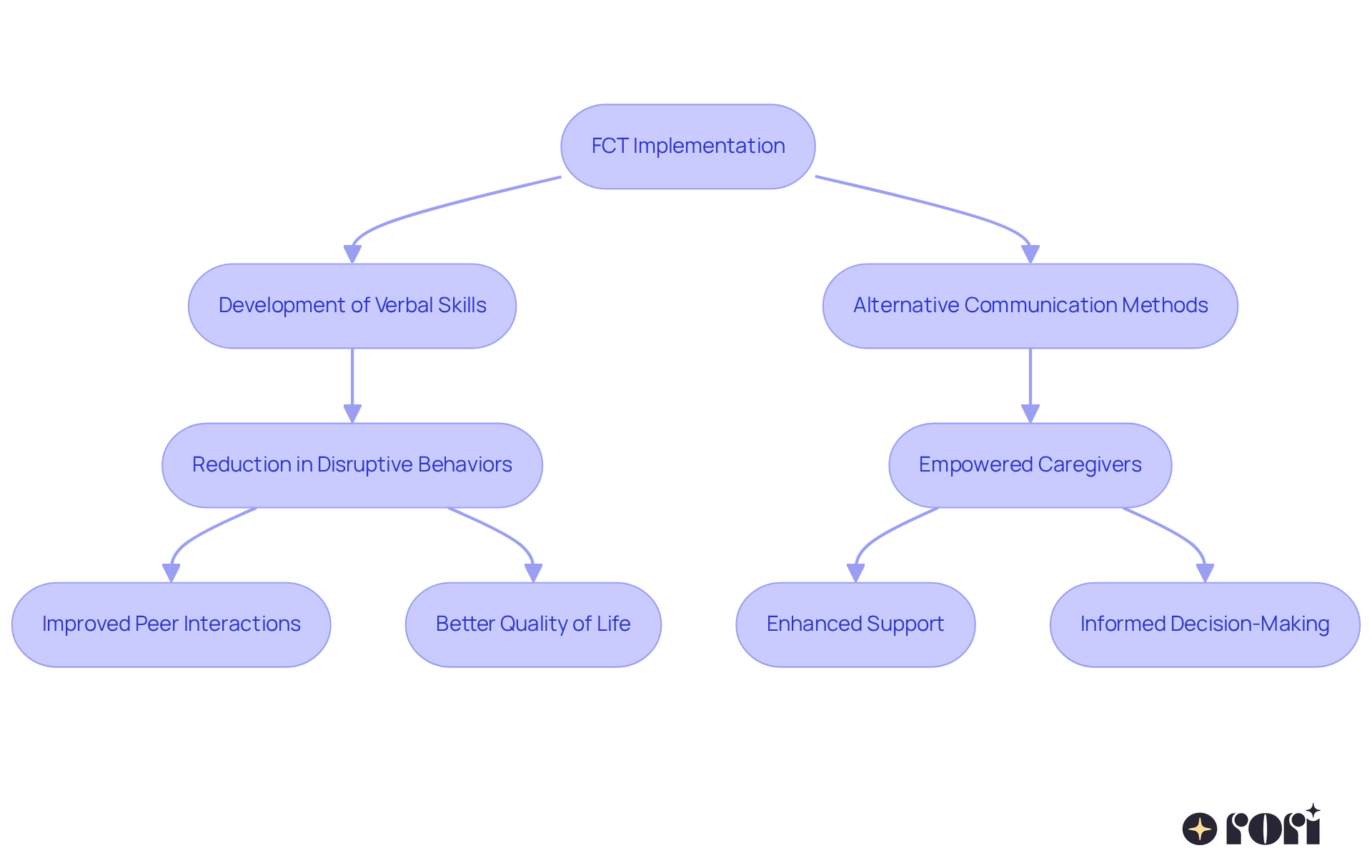
ABA functional communication training is such a game-changer for improving social interactions among youth with autism! By helping them develop effective interaction skills, ABA functional communication training enables these young individuals to connect more deeply with their peers. Imagine how exciting it must be for them to express themselves and share experiences, leading to better relationships and increased participation in group activities.
When social skills improve, friendships blossom, and a sense of belonging and acceptance within their social circles grows. Studies reveal that kids who build strong interpersonal skills through ABA functional communication training see remarkable improvements in their peer relationships. They're better equipped to navigate social situations and express their needs appropriately.
At Rori Care, our compassionate clinical leadership team is all about promoting neurodiversity and supporting youth success. We truly believe in the power of effective communication as a cornerstone for fostering positive peer relationships. This commitment enhances the implementation of ABA functional communication training, paving the way for social integration and emotional well-being for youth with autism. Let’s explore this together and see how we can make a difference!
Aba functional communication training can significantly enhance independence in kids with autism by assisting them in effectively expressing their needs. At Rori Care, we’re all about empowering your little one with the essential skills they need to navigate the world on their own.
Research shows that kids who participate in ABA functional communication training make great strides in self-advocacy, leading to a better quality of life. For example, one study revealed that participants who engaged in ABA functional communication training for 2 to 22 years felt more confident in expressing their preferences and making informed choices—super important for self-advocacy!
Developmental psychologists emphasize that effective communication, particularly through aba functional communication training, is key to self-advocacy, highlighting its crucial role in promoting independence. As young individuals master these interaction skills, they often show incredible progress in their daily activities, showcasing how transformative these abilities can be for their overall growth.
However, we must acknowledge that challenges, like limited facilitator availability, can impact the effectiveness of FCT. At Rori Care, we’re here to tackle these hurdles head-on by providing extensive support and resources to both youth and caregivers. We want to ensure you have the knowledge and strategies you need to achieve your behavioral goals. Let’s explore this together!
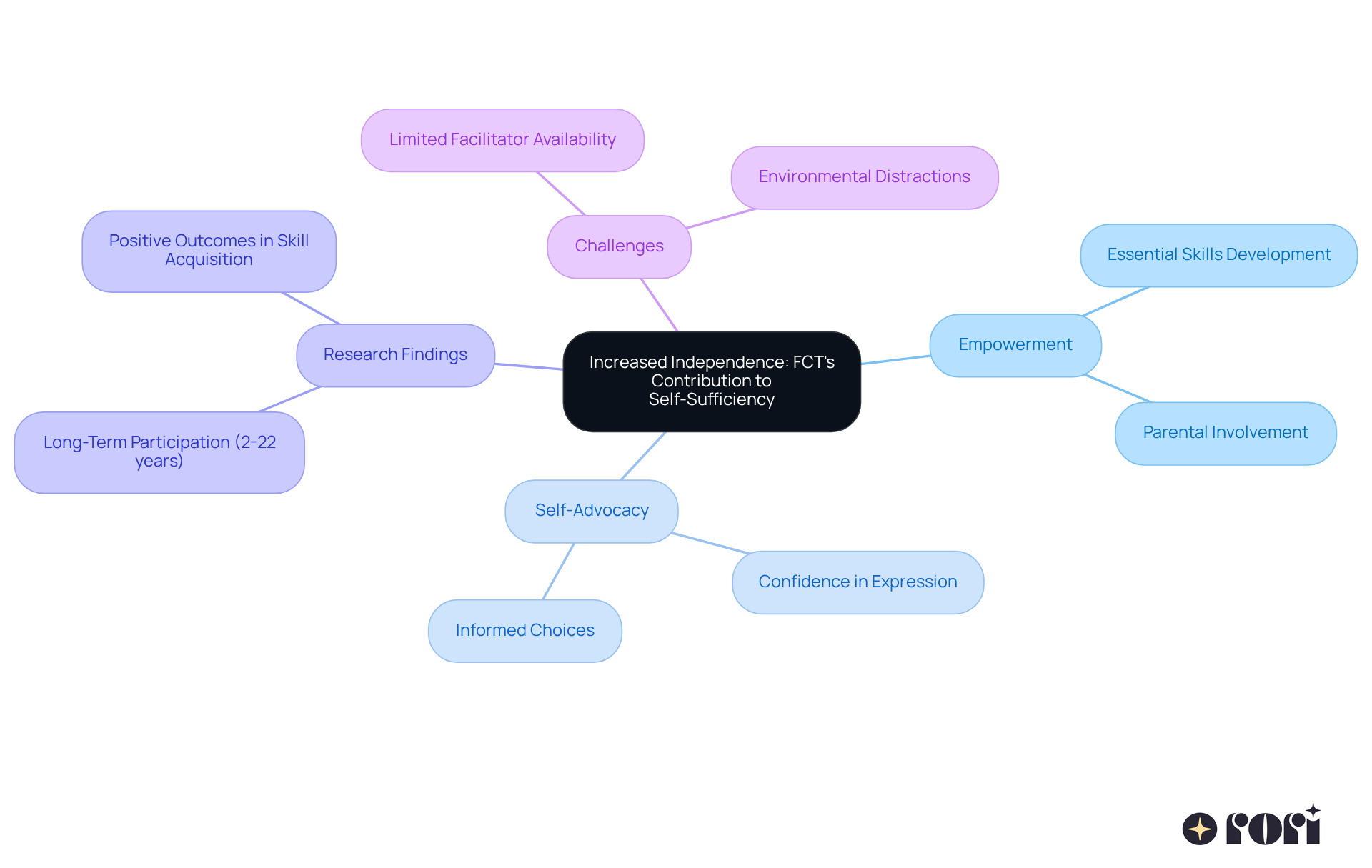
ABA functional communication training offers wonderful benefits that extend beyond just improving interactions; it plays a vital role in enhancing the overall well-being of children with autism. By effectively reducing frustration and challenging behaviors, FCT helps create a more positive emotional environment. For example, anxiety episodes can drop from 70% to 30%, and frustrating behaviors can decrease from 65% to 20% after FCT is put into practice.
As kids develop better interpersonal skills, they build stronger relationships with peers and caregivers, fostering a supportive atmosphere that nurtures emotional and social growth. When young individuals learn to express their needs more clearly, they experience less anxiety and frustration, significantly boosting their quality of life. Mental health experts emphasize that cultivating effective communication is key to emotional health, empowering children to navigate social situations with confidence.
Family involvement in ABA functional communication training is crucial, as it enhances the effectiveness of interventions and helps develop communication skills. Educating caregivers is essential, equipping them with the tools needed to offer the right support at home, complementing professional help and ensuring consistency. This active participation not only leads to better behavioral outcomes but also empowers caregivers, reducing stress and improving overall family dynamics.
Ultimately, FCT encourages a holistic approach to autism care, ensuring that each individual's mental and emotional well-being is prioritized and nurtured. To make the most of ABA functional communication training, caregivers are encouraged to actively engage in training sessions and consistently apply what they learn at home. Let’s explore this together! We’re here to help you every step of the way!
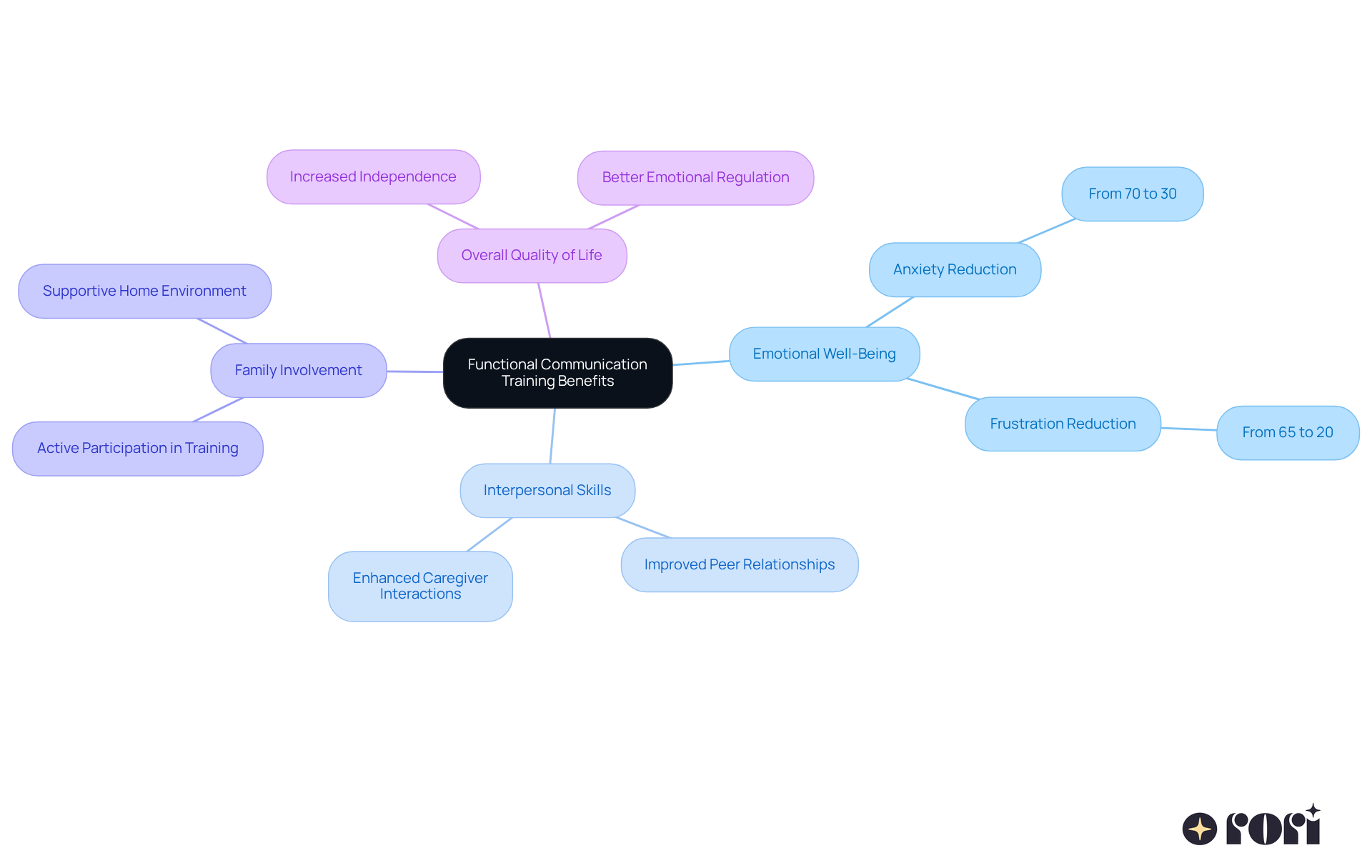
Parental involvement is truly essential for the success of Functional Communication Training (FCT). When parents reinforce strategies learned during therapy sessions at home, they create a consistent interaction environment that boosts their child's learning. Engaged parents can help their children generalize these interaction skills across different settings, leading to even better outcomes. Research indicates that training parents in at-home interventions significantly enhances children's social and interaction abilities. A meta-analysis of over 50 studies has shown notable improvements for those receiving such support.
Success stories are everywhere, showcasing how parents have effectively supported their children's communication development. For instance, families who apply FCT techniques at home have reported remarkable progress in their children's ability to express needs and engage in conversations. This consistent reinforcement not only aids in skill retention but also fosters a sense of confidence in young individuals as they navigate social interactions.
Family therapists emphasize the importance of this involvement. They note that when parents have the right tools and knowledge, they can profoundly impact their child's interaction journey. By embracing FCT strategies at home, parents play a vital role in their child's development, ensuring that the benefits of therapy extend beyond clinical settings. Plus, Rori Care's behavior care engine continuously updates treatment plans based on progress report data, boosting the effectiveness of interventions.
Given the current shortage of practitioners leading to long wait times for treatment, parent-led strategies are more crucial than ever. Rori Care offers resources like blogs and podcasts to empower families with the knowledge and tools needed to implement FCT effectively at home. This enhances support and informed decision-making for caregivers. Let’s explore this together and ensure our kids thrive in their communication journeys!
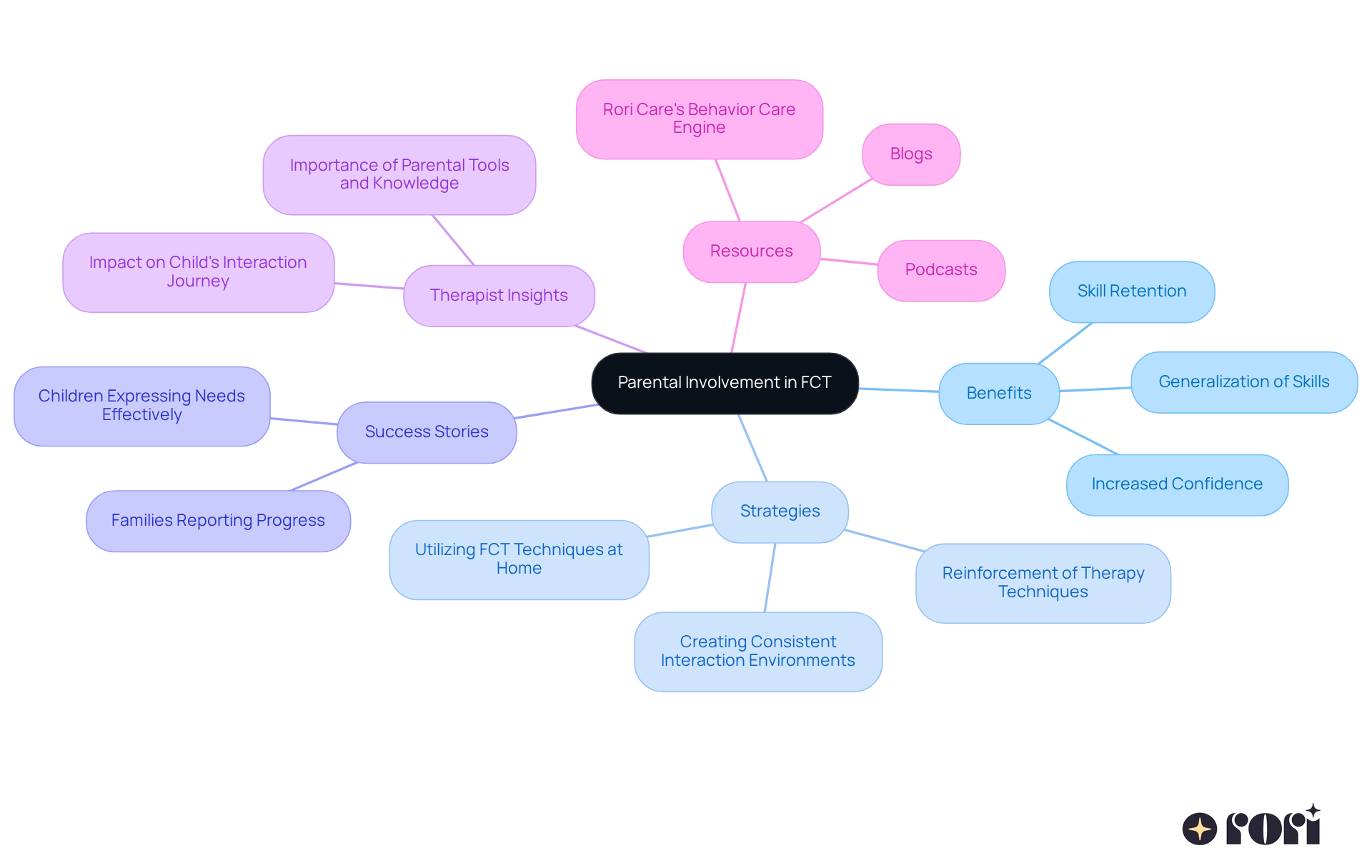
Aba functional communication training is truly grounded in evidence-based practices, and there's a wealth of research showing just how effective it can be in boosting communication skills for individuals with autism. For instance, studies reveal that ABA functional communication training can significantly enhance expressive language, reduce problem behaviors, and improve social interactions. In a recent randomized controlled trial, youth who received prompt FCT treatment saw an incredible mean reduction of 98% in problem behaviors—talk about a difference! Those who delayed treatment, on the other hand, experienced only minimal improvements. This really highlights the immediate benefits of aba functional communication training.
But that’s not all! FCT has shown positive outcomes in various settings. In schools, teachers who implement FCT have noticed substantial reductions in challenging behaviors, making the learning environment better for students with autism. The systematic approach of aba functional communication training (FCT), which incorporates Functional Behavior Assessments (FBAs) to identify the communicative functions behind behaviors, ensures that interventions are tailored to fit individual needs.
Recent statistics further emphasize how effective FCT can be. Around 60% of applications have shown a positive response, especially in cases where challenging behavior stems from a single function. This shows how FCT can replace disruptive behaviors with appropriate communicative responses, ultimately improving the quality of life for kids and their families.
Experts also support ABA functional communication training as a top-notch intervention for addressing interaction deficits. Researchers point out that FCT not only teaches youth effective interaction strategies but also empowers parents and caregivers to use these techniques successfully. By weaving FCT into their child's daily routine, families can foster meaningful interactions and promote social inclusion.
In summary, the robust research backing ABA functional communication training makes it a go-to intervention for both parents and clinicians. It paves the way for better interactions and fewer problem behaviors for youth with autism. Let’s explore this together! We’re here to help you every step of the way!
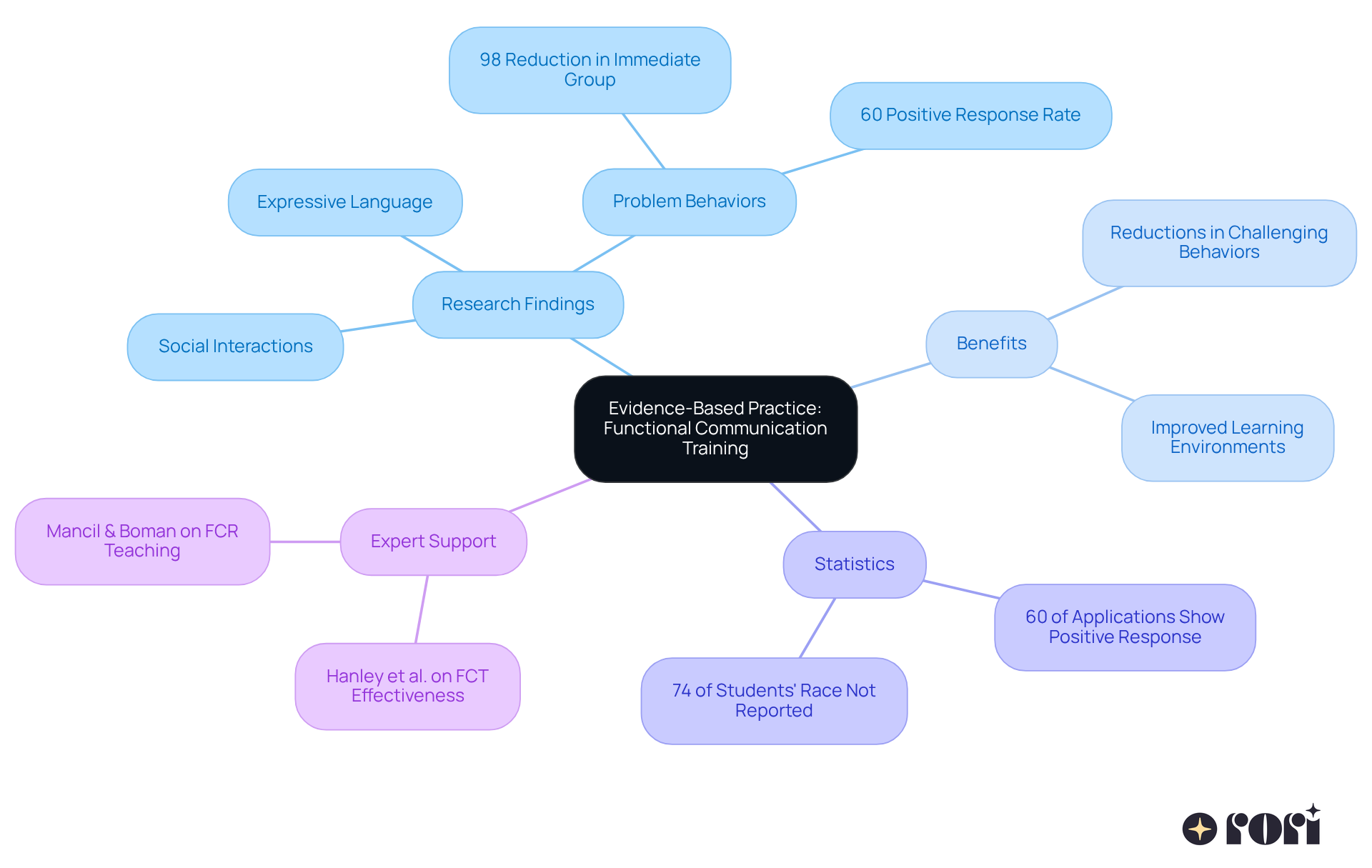
Aba functional communication training is incredibly versatile, making it a great fit for people of all ages and settings. This flexibility allows ABA functional communication training to be customized to meet each individual's developmental needs, whether they are young children or teenagers. Plus, aba functional communication training can be effectively used in various environments, like home, school, and community spaces. This means that young individuals receive consistent support for their expressive abilities, no matter where they are.
For example, schools that have embraced ABA functional communication training often see remarkable improvements in student behavior and academic engagement. In fact, disruptive behaviors can drop by an average of 75% within just the first semester of implementation! Educators stress the importance of thorough training for everyone involved to keep things consistent across different settings. One educator shared, "Accessing the right resources and engaging in professional development are crucial steps to successfully incorporate FCT into practice."
Moreover, the effectiveness of ABA functional communication training is supported by impressive data:
This highlights how important it is to apply aba functional communication training in various environments to enhance interaction skills and improve the overall quality of life for children with autism. By addressing each individual's unique needs and ensuring that aba functional communication training is consistently applied, families and educators can work together to create a supportive atmosphere that fosters effective communication.
And let’s not forget the role of caregiver involvement! When caregivers are actively engaged and educated about ABA principles, they can offer valuable insights and data that help shape treatment plans. This partnership not only boosts the effectiveness of FCT but also empowers caregivers, equipping them with the knowledge and skills needed to support their children’s behavioral goals. As a result, families can face challenges and encourage development with a compassionate and informed approach.
So, let’s explore this together! We’re here to help you every step of the way!
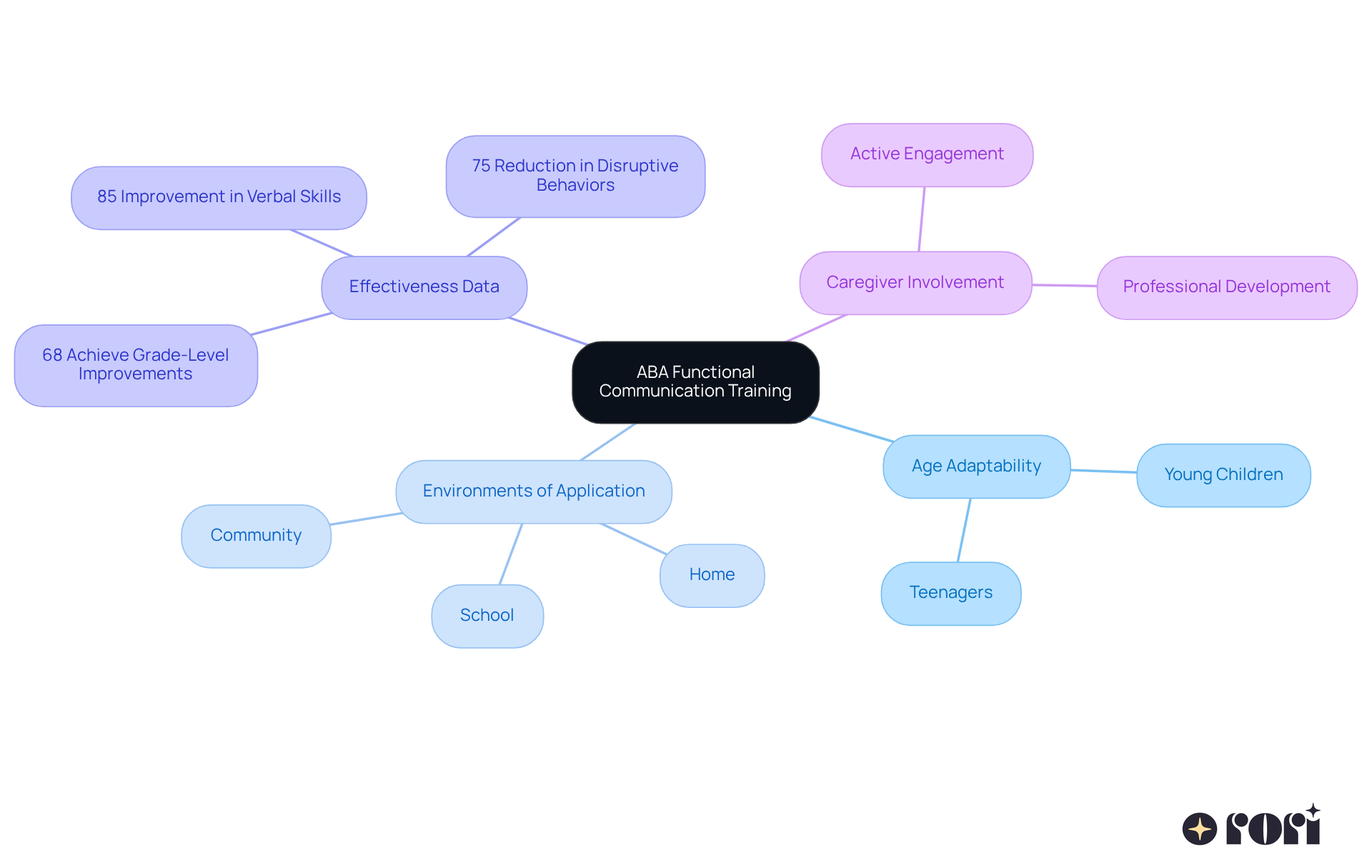
Real-life success stories of young people who have gone through ABA functional communication training really highlight how impactful this intervention can be for communication and quality of life. For instance, one young person who once found it hard to express their needs started using simple sign language and picture cards. This shift led to a noticeable drop in frustration and challenging behaviors. Another student blossomed socially, making friends at school after learning to kick off conversations using FCT strategies. These stories truly showcase FCT's transformative power, demonstrating how it not only boosts interpersonal skills but also enriches the lives of youth with autism.
Did you know that data shows 90% of youngsters make significant progress when caregivers actively join in the suggested training hours? This really validates how effective FCT can be in nurturing meaningful communication and social connections. Caregiver education is a key piece of this puzzle, empowering caregivers to make informed choices and provide consistent support at home, which beautifully complements professional interventions. By diving deeper into ABA principles and strategies, caregivers become better equipped to help their kids, leading to improved behavioral outcomes.
And here’s something exciting: FCT delivered via telehealth has shown an amazing mean reduction of problem behaviors by 98% over a 12-week period! This highlights how accessible and effective this intervention can be in various formats. The knowledge and skills caregivers gain through training not only empower them but also enhance family dynamics, ultimately supporting child development and overcoming challenges associated with autism. Let’s explore this together! We’re here to help you every step of the way!
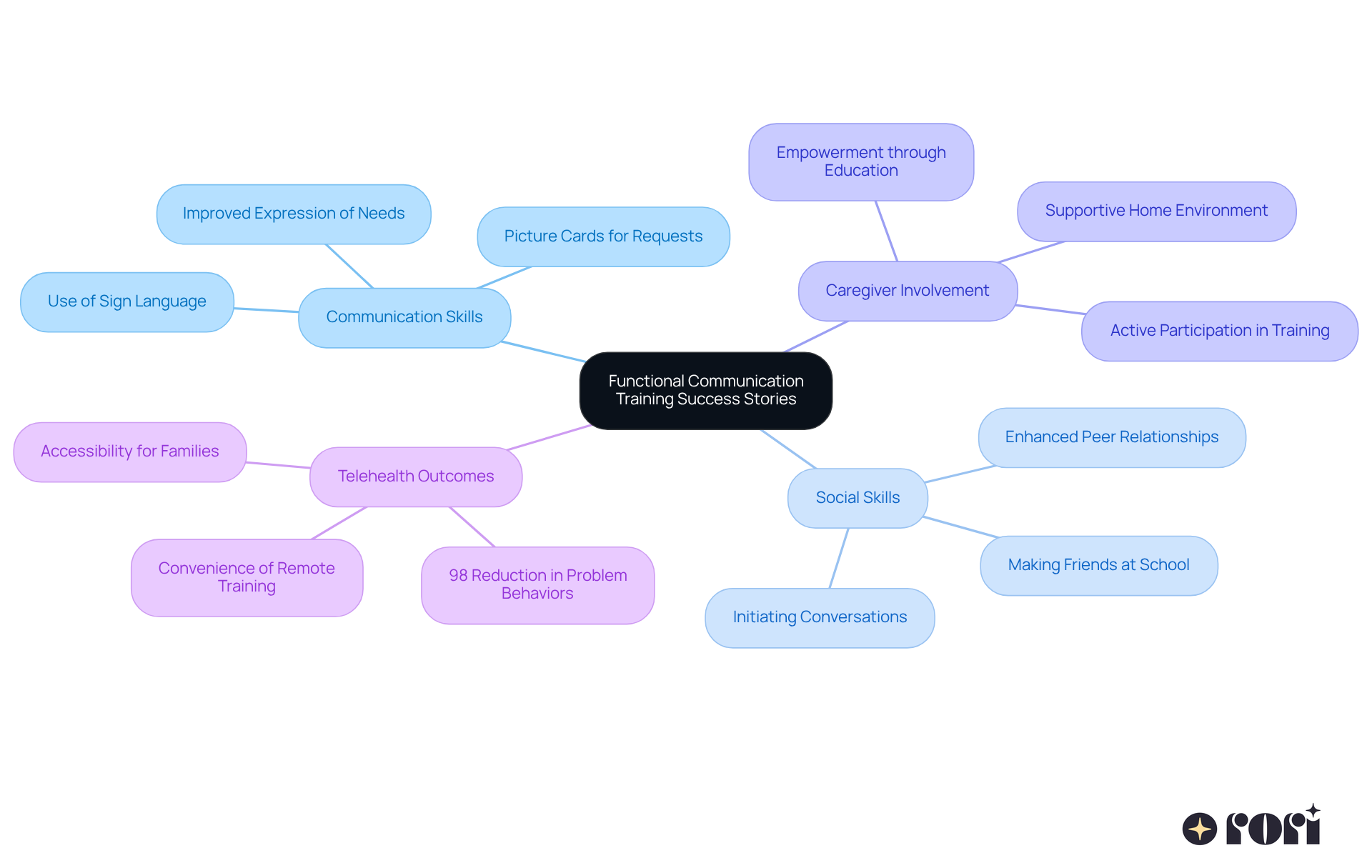
ABA functional communication training (FCT) is such a wonderful tool for enhancing the lives of children with autism! It equips them with essential communication skills that not only promote independence but also reduce frustration and improve social interactions. By focusing on personalized strategies and involving caregivers, FCT addresses individual challenges while creating a nurturing environment for growth and development.
Throughout this article, we've explored the many benefits of FCT—like its role in helping with expressive language development, reducing problem behaviors, and enhancing peer relationships. The evidence supporting FCT really highlights its effectiveness in various settings, showing significant improvements in communication skills and overall well-being. Plus, when caregivers are engaged in the training process, these positive outcomes are amplified, showcasing the power of collaboration between professionals and families.
Ultimately, embracing ABA functional communication training offers a holistic approach to autism care, ensuring that children can truly thrive in their communication journeys. By actively participating in FCT and applying what you've learned at home, you can make a significant impact on your child's development. This commitment to fostering effective communication not only enriches the lives of children with autism but also strengthens family dynamics. Together, we can pave the way for a brighter future filled with meaningful interactions and connections. Let’s explore this journey together!
What is Rori Care's approach to ABA therapy?
Rori Care utilizes a personalized approach to ABA therapy through functional communication training, tailored to meet the unique interaction needs of each child. The interventions are designed based on individual challenges and strengths.
How does ABA functional communication training help children with autism?
ABA functional communication training aids children with autism in developing expressive language skills by teaching them practical communication methods such as gestures, pictures, or speech. This helps them effectively share their needs and reduces frustration from communication barriers.
What role do caregivers play in ABA functional communication training?
Caregivers are encouraged to learn and apply ABA principles and strategies to support their children's behavioral goals. Their involvement enhances the effectiveness of the training and helps create a consistent environment for the child.
What are the benefits of setting specific goals at home?
Setting specific, achievable goals at home that align with therapy strategies can significantly boost a child's progress and development, reinforcing the skills learned during therapy.
How does FCT minimize challenging behaviors in children?
ABA functional communication training helps reduce problem behaviors by teaching children alternative ways to communicate their needs, such as verbal requests or sign language. This proactive approach lessens frustration and decreases the likelihood of disruptive behaviors.
What evidence supports the effectiveness of ABA functional communication training?
Research indicates that classrooms implementing FCT can see an average reduction of 75% in disruptive behaviors within the first semester. Many children experience significant behavioral improvements within 2-4 weeks of consistent practice.
What are the benefits of caregiver education in supporting FCT?
Caregiver education enhances support for children, enables informed decision-making, and empowers caregivers by increasing their confidence in assisting their children, which ultimately fosters a nurturing environment.
How does FCT contribute to the overall quality of life for children and families?
By improving communication skills and reducing frustration, ABA functional communication training enhances social integration and independence for children, leading to better behavioral outcomes and an improved quality of life for both the children and their families.